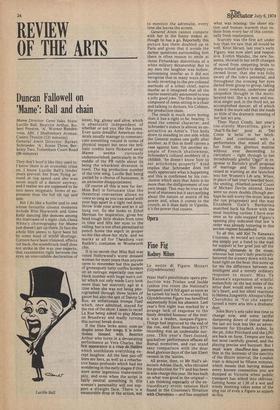Opera
Fine Fig
Rodney Mlles
Le nozze di Figaro Mozart (Glyndebourne) Peter Hall's penultimate opera production was Tristan und Isolde (unless you count the National's Tempest) and it fell apart as soon as he turned his back. Conversely, his Glyndebourne Figaro has benefited enormously from his absence. Last year's first night was marked by a strange lack of response to the finely detailed humour of the text: it was a leaden, lumpen-Figaro. Things had improved by the end of the run, and Dave Heather's STV recording was an undeniable success. This year's fleet-footed, quicksilver performance effaces all dismal memories, and can stand easy comparison with the dear dead glorious days of the last Ebert version in the 'sixties.
All praise, then, to Mr Hall's associate Adrian Slack, who titivated the production for TV and has been in sole charge this year. He has built on what was good in the original — I am thinking especially of the extraordinary erotic tension Hall found in the Countess's flirtation with Cherubino — and has supplied what was missing: the sheer elation and human warmth that radiate from every bar of this continually fresh masterpiece.
Scarcely was the first act under way than we saw that all would be well. Knut Skram, last year's surly Figaro, was now alert and respon sive. Evelyn Mandac, the new Susanna, showed in her swift changes of mood from simpering bride to sharp-witted spitfire to deeply concerned lover, that she was fully
aware of the role's potential, and throughout the evening her eyes darted from group to group, taking in every overtone, undertone and unspoken thought in the multilayered text. She is a neat and musical singer and, in the third act, an accomplished dancer, all of which ' made it the more odd that she made so little of the dramatic meaning of, her last act aria.
Then Nucci Condo, last year's too-stately Marcellina, gave a 'that'll-fix-her' pout at 'Del Conte la bella' in her bitchduet, and continued with a performance that mined all the fun from this glorious matron without ever descending to caricature — right through to her incredulously gleeful 'Oggi?' in response to Bartolo's gruff proposal of marriage and the eyebrow raised in warning as she launched into her Women's Lib aria. When, in place of last year's bearded boor, the smiling, chiselled-jawed Count of Michael Devlin entered, there were no more doubts (though perhaps he will worry the music less as the run progresses) and the way Elizabeth Gale's Barbarina• snatched back his flower with the most insulting curtsey I have ever seen as he side-stepped Figaro's opening ploy indicated that law 'n ,order was already tottering in this ancien-regime household.
To all this, add Kin Te Kanawa's Countess. At second act curtin rise she simply put a hand to the wall for support in her grief just off the stabbing sforzando in the music, whereas last year's lady practically battered the scenery down with her head right on the beat; this sums up for me the difference between an intelligent and a merely ordinary response to music. Miss Te Kanavva's expression of wistful melancholy on the last notes of the letter duet would melt even a critic's heart, and her silent reactions to Helena Jungwirth-Ahnsjoo's fine Cherubino in 'Vol che sapete' turned a mere aria into a dramatic duet.
John Bury's sets take less time to change now, and some tactful dampening down of colour makes the last act look less like an advertisement for Elizabeth Arden. In the pit, John Pritchard and the LPO are back on form. Tempos are fast, but most carefully geared, and the playing precise and buoyant. But I must warn chauffeur-less patrons that in the interests of the sanctity of the dinner interval, the London train is delayed by fifteen minutes, which means that having missed every known connection you are dumped at Victoria when public transport has wilted into oblivion. Getting home at 1.30 of a wet and windy morning takes some of the zing out of even a Figaro as superb as this.


































 Previous page
Previous page